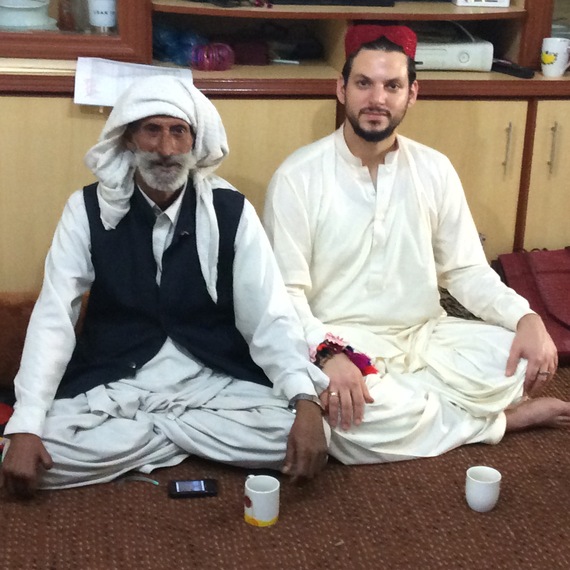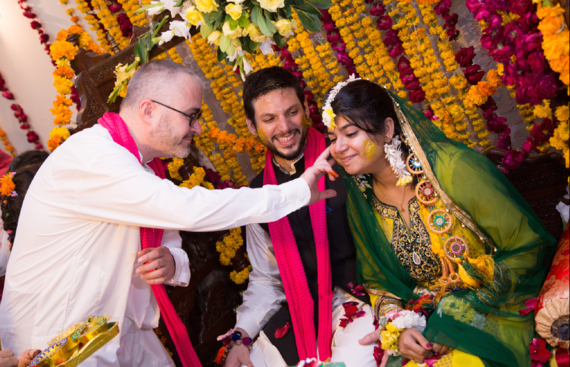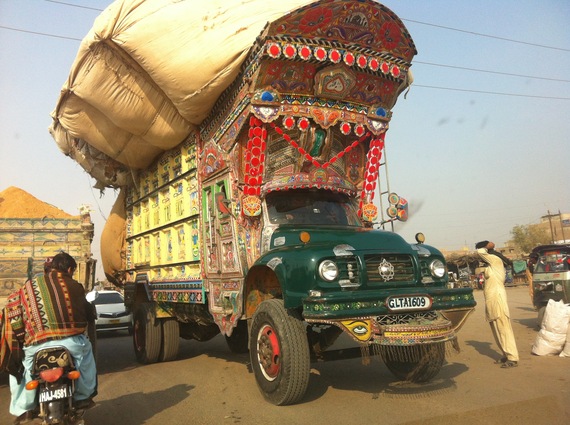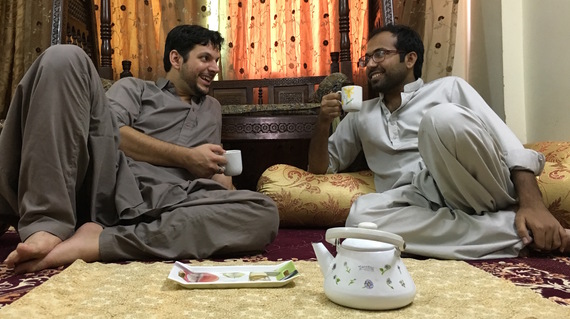When I first met my wife, Khalida Brohi, everything felt foreign. She will tell you the same. I grew up in a middle class Italian-American household. Khalida, however, is from an ancient and indigenous tribe, the Brahui of southern Pakistan, who speak an endangered Dravidian language of the same name that dates back 3,000 to 5,000 years (depending on your sources). She comes from a small tribal community in Pakistan where they eat on the floor with their hands, where men and women alike dress modestly, and where wage laboring men wear hot-pink scarves as handkerchiefs to soak up their sweat, and then carry their hauls of sugar cane or gravel in large, elaborately and brightly hand-painted trucks, to name only a few of the most obvious differences.
If I had gotten stuck on our differences, I never would have discovered the world of caring, light, and love that comes with her. While our culture generally lacks the tools to overcome interpersonal differences, or to bring strangers together, Khalida's is quick to bring a cup of chai to help bridge any gaps. "Chai" literally means "tea." Suleimani chai, named after King Solomon of Jerusalem, is the simplest of teas consisting of water, spices, black tea and sugar. It is said that the king enjoyed it at home and through his travels, using whatever local ingredients were available for his brew.
In Pakistan, chai is not just for kings. Far from it. Chai is for everyone: the rich and sophisticated, and the poor alike. It is perhaps the most democratizing brew on the planet. All can--and do--enjoy it. And it is the first step in gracious hosting. It is said in Balochistan, Pakistan (where my wife is from) that someone can serve a whole goat in your honor, but if he has not offered you chai, then he has been a bad host.
Chai shortens the distance between strangers. For this reason, chai is one of the most powerful of all social tools, especially when it comes to conflict resolution. Anything can be solved over a cup of chai...or three or five. Chai is humanizing. It takes any grievance between two people and puts it into an egalitarian context of sharing. Chai time is also the way families and communities stay connected. It becomes the source of local news and politics. And because all parties respect the holiness of hospitality, each party is sure to be on his or her best behavior. In this way, chai puts care and concern at the center of each interaction. It demands empathy. It is the single best way to soothe fears, dismantle discrimination, and a great way to become friends.
Chai became a crucial tool for Khalida and me. It brought our people together and made our marriage possible.
In 2014 when I reached out to my father in-law to ask for Khalida's hand in marriage, there were some serious hurtles. No woman in his tribe had chosen her own husband before, let alone a white man, and he was not prepared to face the onslaught of questions and concerns that would ensue. Even after I publicly accepted Islam at a mosque in Los Angeles, he still doubted me. As for my late mother, who was suffering from stage 4 lung cancer at the time, she did not see it possible to hand over her only child to a crazy Pakistani girl fighting honor killings in tribal areas of her country. When the mutual distrust was at its height, Khalida and I brought our two families together in Venice, Italy in 2014 where Khalida was speaking at the Pilosio Peace Building conference.
Both families sat in a small, second-floor apartment in the heart of the old city of Venice, which we convinced Pilosio to book us to share. They faced each other in silence. Finally, out of shear discomfort, Khalida's mother awkwardly excused herself to the kitchen to make some chai (and escape). My father in-law hurriedly followed her asking for a cup too. Soon the cups tinkled. The warm scent of boiling milk wafted through the Italian living room of the airbnb, and 6 cups of delicious chai emerged to solve the issue we were grasping at. My father in-law started talking. My mother, attentive and engaged, listened. Soon they were chatting--and even laughing--realizing quickly how similar their personalities were. As pragmatic realists who had overcome extreme difficulties in life, they shared a similar sense of dignity, the same values, a keen sense of facts, and sharp minds, which often led them to more cynical observations and pronouncements on the world. Though their experiences and perspectives were different, they seemed to agree more often than not, and even came to admire each other. My mother in-law smiled with pride, as amazed as we were at the minor miracle her chai had unleashed. The engagement was fixed. Both families were happy.
My mother passed away on November 16th of that year, missing our wedding in Pakistan by 2 months. When I arrived in Karachi in early January with my American and international entourage of all different races and religions to celebrate our 10-day wedding, the first thing we did was enjoy chai. Chai to welcome us. Chai with the family. Chai to welcome the guests of the family. Chai at least 8 times a day. This being the first wedding for Khalida's tribe to take place in a city, her family had decided to send buses to Balochistan and around Sindh to bring all of their people down to Karachi. When the buses arrived, colorful Brahui dresses, turbans and big shalwars (pants) were a sight to behold. Khalida's cousins who herd sheep in the mountains of Moola in Balochistan, her aunts who had never seen a city, her uncles who work on their agricultural lands, all arrived to see this big wedding.
Among all of them was the most unexpected arrival of Khalida's uncle, a tribal leader in a few villages in Balochistan. Such leaders are known rarely to join a wedding, especially one so far from home. The guests started pouring in, and suddenly there was silence when he entered the room. Someone had to whisper to me what was happening. Khalida's brothers ran to bring him pillows to put under his legs as he sat Brahui-style, and some girls scurried to the kitchen to bring him water and put on a pot of chai. Soon he and I were alone in the biggest room of the apartment. He sat right next to me in silence with a grim face. I was nervous, scared I would say the wrong thing (not that he would have understood me) or make the wrong gesture, and who knew what the consequences could be. This was a very foreign land for me with very different rules and social norms. When the aroma of chai filled the air, I knew from experience everything would be okay. The tinkling of cups settled the atmosphere and people started wandering around us. When the chai arrived, it occurred to me that pictures were a sort of universal language, so I broke out my iPad to show him a piece of my life in America. By that time he was sipping on his chai, a smile finally breaking on his face, a glint of respect in his eye. We sat together drinking this magical liquid that seemed to settle our hearts, and prompt mutual appreciation and admiration. Our only real language the long hiss of our cooling sips from our steaming cups.

To this day, that single interaction remains one of the most potent experiences of my life. We solved all of our apprehensions and differences in one single, almost silent conversation, an interaction only made possible by chai. I doubt sharing a meal could have been as powerful. Food is a primal need that must be satisfied for survival. Chai is purely social, and yet almost as ancient and necessary. It engages all senses of a human being.
I am now famous among her tribe in Balochistan, mostly because of that half hour I spent with her uncle. People ask after me with love and concern. They've never met me. And it's not clear whether we will ever meet. But we share a lasting connection that all started over a fresh, hot cup of chai.
 Khalida receiving a traditional turmeric paste from a guest from Germany on the mayoon celebration of our wedding
Khalida receiving a traditional turmeric paste from a guest from Germany on the mayoon celebration of our wedding A typical working truck carrying a load of crops to market
A typical working truck carrying a load of crops to market